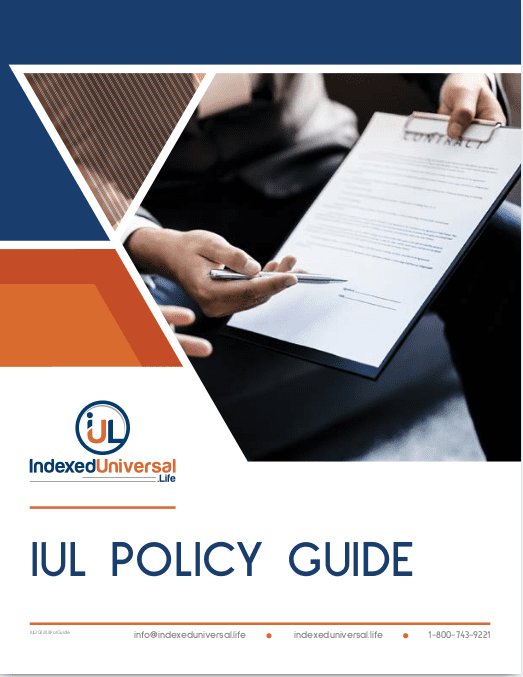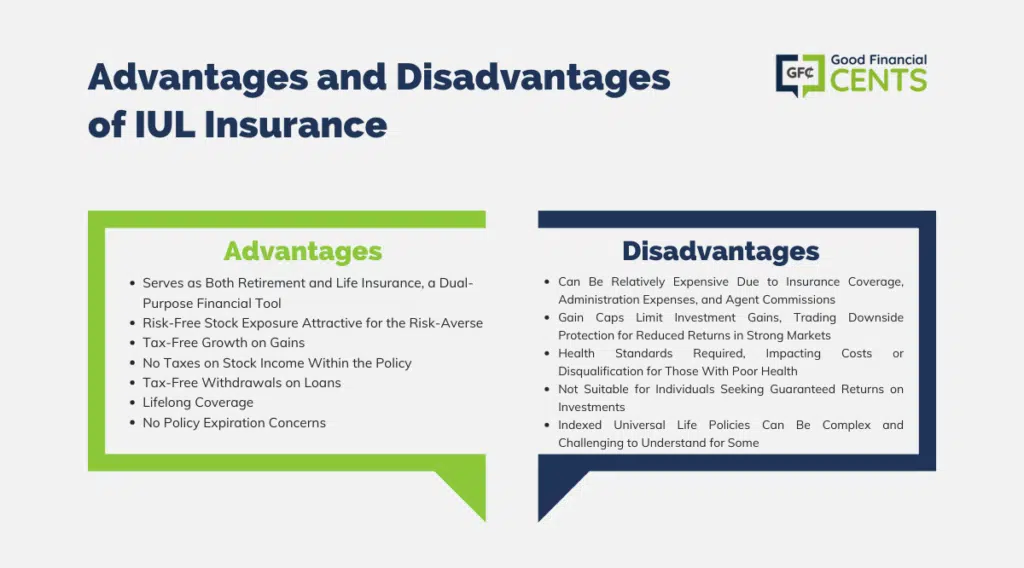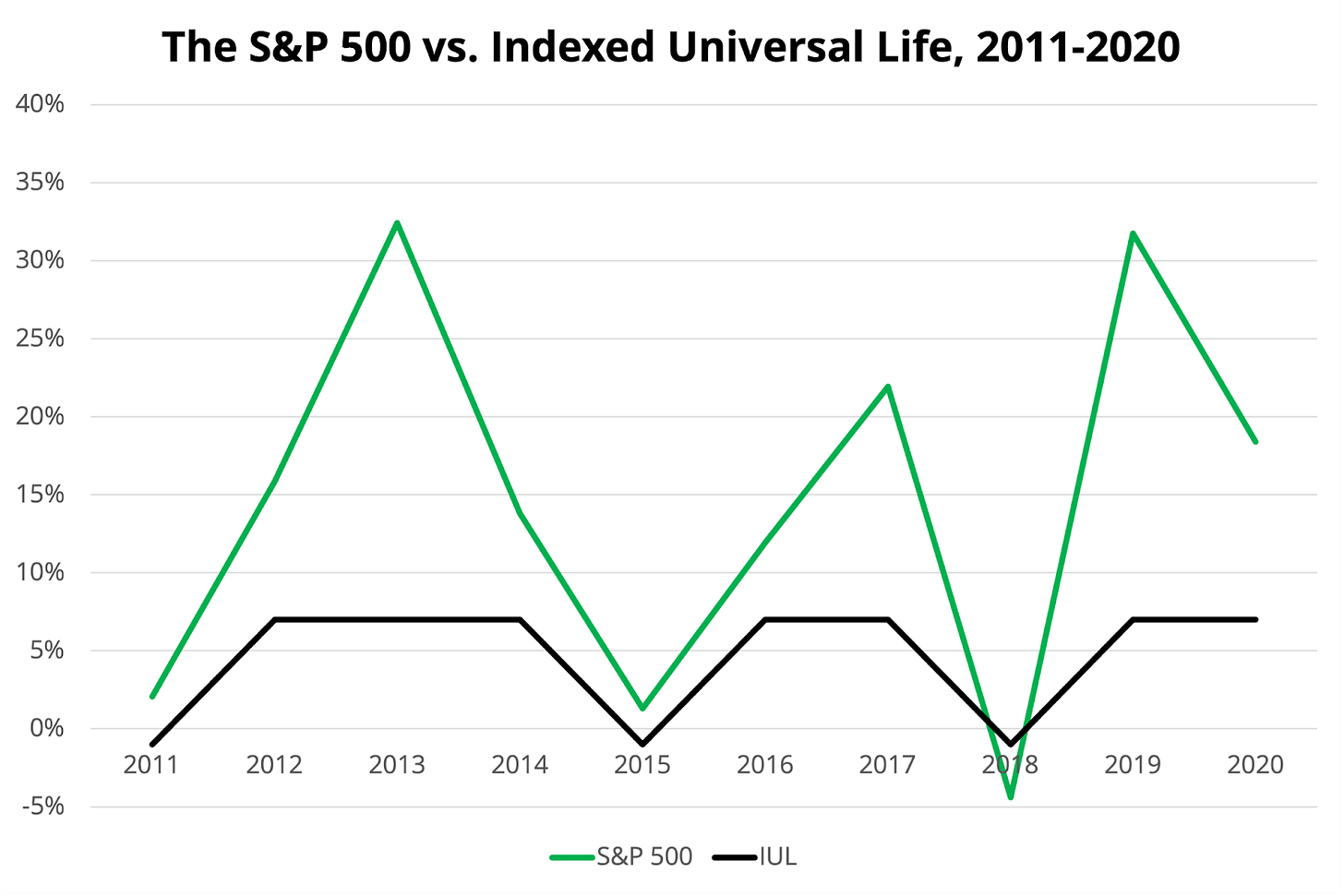All Categories
Featured
Table of Contents
1), frequently in an effort to defeat their category averages. This is a straw man debate, and one IUL people like to make. Do they contrast the IUL to something like the Vanguard Total Stock Market Fund Admiral Show no load, an expense proportion (EMERGENCY ROOM) of 5 basis factors, a turnover proportion of 4.3%, and an outstanding tax-efficient document of circulations? No, they contrast it to some terrible actively managed fund with an 8% load, a 2% EMERGENCY ROOM, an 80% turnover proportion, and a terrible document of short-term funding gain distributions.
Mutual funds often make yearly taxed circulations to fund owners, even when the worth of their fund has actually gone down in value. Common funds not only call for income reporting (and the resulting annual taxes) when the common fund is increasing in value, yet can also impose earnings tax obligations in a year when the fund has actually gone down in value.
That's not how common funds work. You can tax-manage the fund, gathering losses and gains in order to decrease taxed distributions to the financiers, however that isn't in some way going to change the reported return of the fund. Only Bernie Madoff kinds can do that. IULs stay clear of myriad tax obligation catches. The ownership of mutual funds may call for the shared fund owner to pay projected tax obligations.

IULs are simple to position to ensure that, at the owner's death, the recipient is exempt to either income or inheritance tax. The exact same tax reduction strategies do not function almost as well with shared funds. There are many, usually costly, tax obligation traps related to the timed buying and marketing of common fund shares, traps that do not put on indexed life Insurance policy.
Opportunities aren't really high that you're mosting likely to undergo the AMT because of your shared fund distributions if you aren't without them. The remainder of this one is half-truths at finest. While it is true that there is no revenue tax due to your heirs when they inherit the earnings of your IUL plan, it is likewise real that there is no earnings tax obligation due to your successors when they acquire a common fund in a taxed account from you.
Maximum Funded Insurance
The government estate tax obligation exception restriction is over $10 Million for a couple, and growing yearly with inflation. It's a non-issue for the substantial bulk of physicians, a lot less the rest of America. There are much better means to stay clear of estate tax obligation concerns than acquiring investments with low returns. Common funds may create earnings taxation of Social Safety and security benefits.

The development within the IUL is tax-deferred and may be taken as free of tax earnings through financings. The plan owner (vs. the shared fund manager) is in control of his or her reportable earnings, thus allowing them to minimize or perhaps get rid of the taxes of their Social Safety advantages. This one is wonderful.
Right here's one more very little concern. It's real if you buy a common fund for say $10 per share just before the distribution day, and it disperses a $0.50 distribution, you are after that going to owe tax obligations (most likely 7-10 cents per share) although that you haven't yet had any gains.
In the end, it's really concerning the after-tax return, not how much you pay in taxes. You're also possibly going to have more cash after paying those taxes. The record-keeping demands for owning mutual funds are dramatically more complicated.
With an IUL, one's documents are maintained by the insurance provider, copies of annual statements are mailed to the proprietor, and circulations (if any kind of) are completed and reported at year end. This one is likewise sort of silly. Certainly you should keep your tax documents in situation of an audit.
Nationwide Indexed Universal Life Accumulator Ii
Rarely a factor to get life insurance coverage. Mutual funds are typically part of a decedent's probated estate.
Additionally, they are subject to the delays and expenditures of probate. The earnings of the IUL plan, on the other hand, is always a non-probate distribution that passes outside of probate directly to one's called beneficiaries, and is as a result exempt to one's posthumous creditors, undesirable public disclosure, or comparable delays and costs.
Medicaid incompetency and life time income. An IUL can give their owners with a stream of revenue for their whole life time, regardless of exactly how long they live.

This is advantageous when organizing one's affairs, and converting assets to earnings before a retirement home confinement. Mutual funds can not be converted in a comparable fashion, and are often considered countable Medicaid properties. This is one more stupid one advocating that poor individuals (you understand, the ones that require Medicaid, a government program for the inadequate, to pay for their retirement home) should utilize IUL as opposed to mutual funds.
Ul Mutual Company
And life insurance policy looks horrible when contrasted fairly versus a retired life account. Second, individuals who have money to get IUL above and past their pension are going to need to be terrible at handling money in order to ever before receive Medicaid to pay for their assisted living home prices.
Persistent and incurable health problem biker. All policies will certainly enable a proprietor's simple access to cash from their plan, typically waiving any type of surrender penalties when such people endure a severe ailment, need at-home treatment, or become constrained to an assisted living facility. Mutual funds do not give a similar waiver when contingent deferred sales fees still put on a common fund account whose owner requires to sell some shares to money the prices of such a stay.
Universal Life Insurance Single Premium
You obtain to pay even more for that advantage (biker) with an insurance coverage policy. Indexed universal life insurance coverage offers fatality advantages to the beneficiaries of the IUL owners, and neither the owner neither the recipient can ever before lose cash due to a down market.
I certainly do not need one after I reach economic independence. Do I want one? On average, a buyer of life insurance pays for the true cost of the life insurance benefit, plus the costs of the policy, plus the earnings of the insurance policy firm.
Life Insurance Term Vs Universal
I'm not entirely certain why Mr. Morais threw in the entire "you can not lose money" again right here as it was covered fairly well in # 1. He just wished to duplicate the very best selling point for these points I intend. Once again, you don't lose small bucks, yet you can shed actual bucks, along with face severe opportunity price as a result of low returns.

An indexed global life insurance policy policy owner might exchange their policy for a totally various policy without triggering revenue taxes. A mutual fund owner can stagnate funds from one mutual fund firm to one more without marketing his shares at the former (thus activating a taxable event), and buying new shares at the last, frequently based on sales costs at both.
While it holds true that you can exchange one insurance plan for an additional, the factor that people do this is that the initial one is such an awful plan that also after getting a brand-new one and experiencing the very early, adverse return years, you'll still come out in advance. If they were offered the ideal policy the very first time, they should not have any kind of wish to ever trade it and experience the very early, adverse return years once again.
Table of Contents
Latest Posts
Iul For Retirement Income
Best Iul Companies 2021
Iul Comparison
More
Latest Posts
Iul For Retirement Income
Best Iul Companies 2021
Iul Comparison